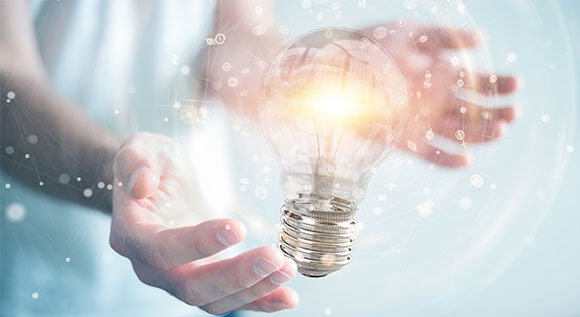Plenty of news from the future
Wanting to be a researcher, to discover the world, to look into the future: it's part of everyone's DNA. Research into future energy worlds makes it possible and provides lots and lots of exciting news.
 © AdobeStock/sdecoret
© AdobeStock/sdecoret
Fancy a journey into the world of energy of the future? The Economic Affairs Ministry's successful research programme 'Smart Energy Showcases – Digital Agenda for the Energy Transition' (SINTEG) is entering its final phase after almost four years, and is delivering plenty of exciting findings. Five model regions have been set up around Germany to test innovative solutions for the energy transition. The WindNODE model region in Germany's north-east presents ways for companies to make more flexible use of green electricity, thus also helping to reduce the burden on the grids. Experts have now produced a best-practice manual summarising the best ways for companies to coordinate their electricity consumption with the fluctuating supply from renewable sources. The brochure, entitled 'Flex Identifizieren!', focuses on individual possibilities to identify and use the available potential. This makes the manual a valuable aid for everyone interested in deploying flexibilities in practice. Anyone interested in learning more from the SINTEG showcases should note these dates: 28 and 29 October 2020. Experts from all five SINTEG model regions intend to present their findings at the final SINTEG conference. The conference can be followed online. For further information, please visit the SINTEG website. The manual can be downloaded here.
Two new regulatory sandboxes launched
Testing out new research findings in real life: this was the exciting opportunity for 20 winners of the Economic Affairs Ministry's 'regulatory sandboxes for the energy transition' competition in July 2019. A number of innovative technologies and processes – such as the manufacture of hydrogen – are being tested in geographically defined experimentation spaces. The findings are to be transferable to the whole of Germany and should help new technologies to reach market maturity more quickly. Two new regulatory sandboxes launched in August 2020.
In Schleswig-Holstein, the partners in Westküste100 are studying the best ways to generate hydrogen from renewable energy and store it. Federal Minister Peter Altmaier said: 'I am delighted that the Westküste100 regulatory sandbox is already implementing elements of the National Hydrogen Strategy.' The highly innovative pioneering project is helping to develop technology in the field of hydrogen.
The parties working on the Integrierte WärmeWende Wilhelmsburg IW3 regulatory sandbox (Integrated HeatTransition Wilhelmsburg) in Hamburg are showing how a reliable and low-cost energy supply to urban areas can work with a high proportion of green electricity. 'With its integrated heat transition concept, IW3 will become a flagship for the energy and heat transition in urban areas,' said State Secretary Andreas Feicht. The two regulatory sandboxes form part of the Federal Government's 7th Energy Research programme.

